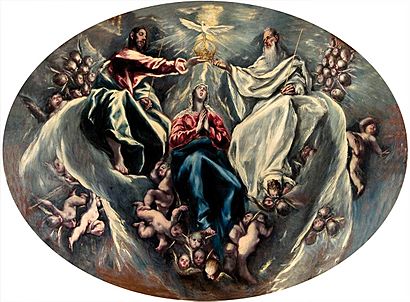Coronation of the Virgin (El Greco, Illescas) facts for kids
Quick facts for kids Coronation of the Virgin |
|
|---|---|
 |
|
| Artist | El Greco |
| Year | 1603-1605 |
| Medium | oil on canvas |
| Dimensions | 163 cm × 220 cm (64 in × 87 in) |
| Location | Santuario de Nuestra Señora de la Caridad, Illescas |
The Coronation of the Virgin is a famous painting created by the artist El Greco between 1603 and 1605. This artwork was one of five paintings made for the main altar of the Santuario de Nuestra Señora de la Caridad, a church in Illescas, Toledo, Spain.
Today, this painting and three others from the original group are still displayed in the church. These include Charity, Nativity, and Annunciation. The fifth painting, called Marriage of the Virgin, is now located in the National Museum of Art of Romania.
Contents
What the Painting Shows
This painting illustrates a special moment known as the Coronation of the Virgin. It shows Mary, the mother of Jesus, being crowned in heaven.
Heavenly Figures in the Art
In the painting, you can see God the Father and God the Son (Jesus) together. They are shown crowning Mary. Above them, the Holy Spirit is represented as a dove, completing the image of the Holy Trinity.
About the Artist: El Greco
El Greco was a very important painter from the late 1500s and early 1600s. His real name was Doménikos Theotokópoulos, and he was born on the island of Crete, which was part of Venice at the time. He later moved to Spain, where he created many of his most famous works.
El Greco's Unique Style
El Greco is known for his unique artistic style. His paintings often feature tall, stretched-out figures and dramatic colors. He used light and shadow in a special way to create a strong emotional feeling in his art. Many of his works have a spiritual or religious theme, like the Coronation of the Virgin.
Where to See the Painting
The Coronation of the Virgin is still located in the Santuario de Nuestra Señora de la Caridad in Illescas, Spain. This church is a significant place for art and history, allowing visitors to see El Greco's work in its original setting.
See also
 In Spanish: La coronación de la Virgen (El Greco, Illescas) para niños
In Spanish: La coronación de la Virgen (El Greco, Illescas) para niños
- List of works by El Greco
 | Janet Taylor Pickett |
 | Synthia Saint James |
 | Howardena Pindell |
 | Faith Ringgold |

